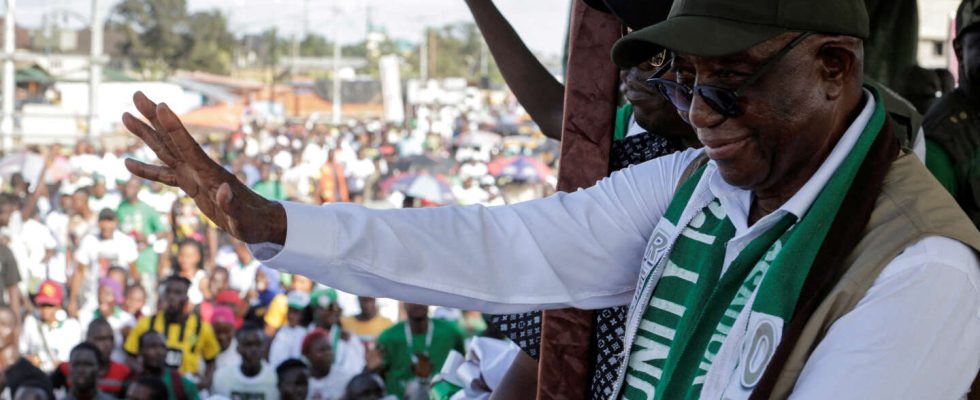The outgoing president of Liberia, George Weah, conceded, Friday evening, November 17, his defeat in Tuesday’s presidential election against opponent Joseph Boakai, while the country is awaiting the publication of the total results of the ballot.
“Tonight, the CDC [le parti de M. Weah] lost the election but Liberia won. It’s time for elegance in defeat”declared Mr. Weah, a former football glory elected in 2017, in a speech on public radio. “The results announced this evening, although not final, indicate that [M.] Boakai has a lead that we cannot catch up with. I spoke to President-elect Joseph Boakai to congratulate him on his victory”said Mr. Weah.
The results published Friday by the electoral commission, after counting the votes in more than 99% of offices, give 50.89% to Mr. Boakai and 49.11% to Mr. Weah. Mr. Boakai had a lead of just over 28,000 votes after some 1.6 million ballots were counted. About 2.4 million Liberians were called to the polls on Tuesday, but no indication has been provided so far of participation.
Dozens of Mr. Boakai’s supporters celebrated the results by dancing in front of one of his party offices in the Fiama district of Monrovia, noted an Agence France-Presse correspondent.
Washington welcomed the victory of Joseph Boakai and “peaceful acceptance of the results” of outgoing President George Weah, according to a press release from the spokesperson for the US State Department. “The people of Liberia deserve free, transparent and peaceful elections”added Matthew Miller.
A revenge
Mr. Boakai will take charge of this English-speaking country of around five million inhabitants, one of the poorest in the world, for six years. This tenor of Liberian politics, vice-president of Ellen Johnson Sirleaf from 2006 to 2018, servant of the State for four decades, has finally made his way, at the age of 78, to the position of head of the State. Unlucky candidate in 2017 during his lost face-to-face in the second round of the presidential election against George Weah, the leader of the Unity Party has been preparing his revenge for a long time.
Pounding his adversary’s mixed record whenever he has the opportunity, he proposes a ” safety plan “ national. He promises to improve infrastructure, invest in agriculture, attract investors, open Liberia to tourism, and restore the country’s image.
“His motivation is to save Liberia from the state it is in” since George Weah took power, Mohammed Ali, spokesperson for his party, told Agence France-Presse (AFP). He lists pell-mell “the influx of illicit drugs, increasing poverty rates, poor governance, the collapse of health and education systems”.
His speech carries. While he largely lost six years ago, obtaining 28.76% on 1er round and 38.46% in the second, he followed the outgoing president in the first round, the two having obtained around 43% of the votes, before beating her in the next round.
Clever alliances
Mr. Boakai promised an inclusive government that reflects Liberia’s political, ethnic, regional, religious and gender diversity. Some candidates like Tiawan Gongloe gave him their support for the second round.
Videos
Le Monde Afrique on Youtube
Every week, videos to understand the news on the continent
Look
From the first round, he knew how to skillfully maneuver to forge alliances with local barons, such as the former warlord Prince Johnson, who supported George Weah in 2017 and who still enjoys strong support in his province of Nimba. Mr. Johnson, who was videotaped sipping beer while his men tortured President Samuel Doe to death in 1990 and who is under U.S. sanctions for corruption, placed one of his men, Jeremiah Koung, in position of vice-president of Mr. Boakai. The candidate won largely in Nimba, a populated region in the northeast, on 1er round.
Like George Weah, Joseph Boakai comes from the population “native”not the elite “American-Liberian” descendant of freed slaves who long dominated the country. He describes himself as an ordinary man who rose from a modest situation through merit and work. Originally from a remote village in the province of Lofa, bordering Guinea and Sierra Leone and often presented as the “granary of the country”he served as Minister of Agriculture from 1983 to 1985 under Samuel Doe.
His opponents believe his advanced age is a handicap and say he is out of touch with younger generations in a country where 60% of the population is under 25. They nickname him “Sleepy Joe”, a nickname also given by opponents to US President Joe Biden, and argue that it is time for him to rest.
During the campaign, his supporters continued to highlight his constant integrity and claim that he will be the only one who knows how to restore confidence in institutions and fight corruption.

